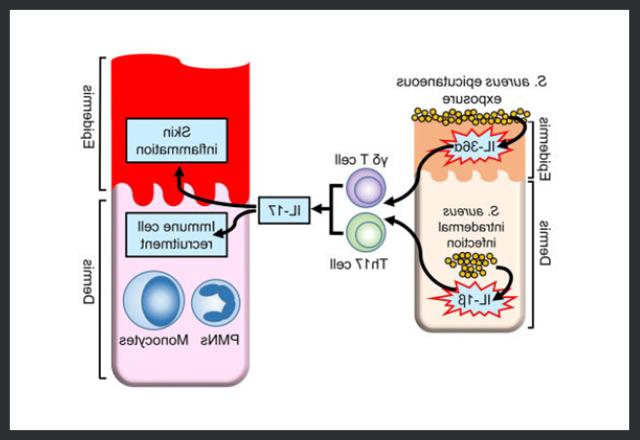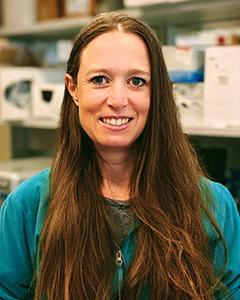The Nathan K. Archer Laboratory
 Staphylococcus aureus colonization during atopic dermatitis contributes to skin inflammation, but the underlying mechanisms are unclear. Our research demonstrates that epicutaneous S. aureus exposure drives skin inflammation, 哪个是由细菌PSMα和宿主IL-36R/ myd88介导的T细胞产生IL-17.
Staphylococcus aureus colonization during atopic dermatitis contributes to skin inflammation, but the underlying mechanisms are unclear. Our research demonstrates that epicutaneous S. aureus exposure drives skin inflammation, 哪个是由细菌PSMα和宿主IL-36R/ myd88介导的T细胞产生IL-17.Welcome to the Nathan K. Archer Laboratory at the Johns Hopkins Department of Dermatology.
我们的目标是了解对皮肤病原体的保护性先天和适应性免疫反应的机制,以及异常免疫反应和皮肤微生物组在炎症性皮肤病发病机制中的作用, including atopic dermatitis and psoriasis. We have made discoveries involving Toll-like receptors (TLRs), IL-1 family cytokines, inflammasome responses, and the role of different T cell subsets (especially IL-17-producing T cells). We are currently investigating the protective immunity to Staphylococcus aureus, which is the most common human bacterial skin pathogen. This area of research is highly significant since S. aureus 由于毒性社区获得性耐甲氧西林的广泛出现,感染构成了重大的公共卫生威胁 S. aureus (MRSA) strains. 在我们的工作涉及致病性免疫机制和失调的皮肤微生物组在促进皮肤炎症和过敏性疾病, we have made key discoveries involving the role of IL-36, MyD88-signaling, and STAT3-signaling. 我们的长期目标是发现可以作为未来免疫治疗和疫苗接种策略目标的机制.
Our research has used innovative in vivo preclinical models, 包括开创性的先进技术在体内全动物光学(生物发光和荧光)成像跟踪细菌清除和宿主免疫反应无创和纵向随着时间的推移, 人皮肤器官型培养模型和具有人皮肤和免疫细胞的新型人源化小鼠模型. 我们的实验室得到了NIH拨款支持(R01和K01拨款)以及广泛的行业和基金会支持.
In addition to our work in the skin, 我们正在研究保护性免疫反应和新型抗菌涂层,以帮助治疗或预防医疗设备的细菌生物膜相关感染, prostheses, and implants. 当细菌生物膜在外来植入物上形成时,这些感染是一种毁灭性的并发症, which inhibit the efficacy of antibiotics and blocks penetration of immune cells. 我们使用最新的多模态成像技术,建立了多个手术后感染的临床前动物模型, including optical, PET, CT, and photoacoustic imaging. 目标是为保护性免疫反应和针对这些生物膜相关植入物感染的新治疗提供新的见解.
Selected Publications
Please review these selected publications or Dr. Archer's full bibliography.
-
- Alphonse MP, Rubens JH, Ortines RV, Orlando NA, Patel AM, Dikeman D, Wang Y, Vuong I, Joyce DP, Zhang J, Mumtaz M, Liu H, Liu Q, Youn C, Patrick GJ, Ravipati A, Miller RJ, Archer NK*, Miller LS*. 2021. 泛半胱天冬酶抑制作为抗MRSA和其他细菌性皮肤感染的潜在宿主定向免疫疗法. Science Translational Medicine. PMID: 34233954.
- Patrick GJ*, Liu H*, Alphonse MP, Dikeman DA, Youn C, Otterson JC, Wang Y, Ravipati A, Mazhar M, Denny G, Ortines RV, Zhang E, Miller RJ, Dillen CA, Liu Q, Nolan SJ, Nguyen K, Marcello L, Do DC, Wier EM, Zhang Y, Caviness G, Klimowicz AC, Mierz DV, Fine JS, Sun G, Goldbach-Mansky R, Marusina AI, Merleev AA, Maverakis E, Garza LA, Milner JD, Gao P, Ramanujam M, Raymond EL, Archer NK*, Miller LS*. 2021. Epicutaneous Staphylococcus aureus induces IL-36 to enhance IgE production and ensuing allergic disease. The Journal of Clinical Investigation. 131(5):143334. PMID: 33645549.
- Archer NK, Jo JH, Lee SK, Kim D, Smith B, Ortines RV, Wang Y, Marchitto MC, Ravipati A, Cai SS, Dillen CA, Liu H, Miller RJ, Ashbaugh AG, Uppal AS, Oyoshi MK, Malhotra N, Hoff S, Garza LA, Kong HH, Segre JA, Geha RS, Miller LS. 2018. 损伤、生态失调和聚丝蛋白缺乏通过角化细胞IL-1α的释放驱动皮肤炎症. Journal of Allergy & Clinical Immunology S0091-6749 (18): 31295-8. PMCID: PMC6424655.
- Advaitaa Ravipati, Sabrina Nolan, Martin Alphonse, Dustin Dikeman, Christine Youn, Yu Wang, Nicholas Orlando, Garrett Patrick, Steven Lee, Roger V. Ortines, Haiyun Liu, Robert J. Miller, Carly A. Dillen, Mark Marchitto, S. Sarah Cai, Lloyd S. Miller, Nathan K. Archer IL-6R/ stat3信号在角质形成细胞而不是T细胞中诱导小鼠牛皮癣样皮炎 Journal of Investigative Dermatology
- Dong X, Limjunyawong N, Sypek EI, Wang G, Ortines RV, Youn C, Alphonse MP, Dikeman D, Wang Y, Lay M, Kothari R, Vasavda C, Pundir P, Goff L, Miller LS, Lu W, Garza LA, Kim BS, Archer NK*, Dong X*. 角化细胞衍生的防御素激活中性粒细胞特异性受体Mrgpra2a/b,以防止皮肤生态失调和细菌感染. Immunity. 2022 Sep 13;55(9):1645-1662.e7. doi: 10.1016/j.immuni.2022.06.021. Epub 2022 Jul 25. PubMed PMID: 35882236; PubMed Central PMCID: PMC9474599.
- Gordon O, Dikeman DA, Ortines RV, Wang Y, Youn C, Mumtaz M, Orlando N, Zhang J, Patel AM, Gough E, Kaushik A, Nuermberger EL, Upton AM, Fotouhi N, Miller LS, Archer NK. 新型恶唑烷酮TBI-223对耐甲氧西林金黄色葡萄球菌感染的三种临床前小鼠模型有效. Microbiol Spectr. 2022 Oct 26;10(5):e0245121. doi: 10.1128/spectrum.02451-21. Epub 2022 Sep 15. PubMed PMID: 36106881; PubMed Central PMCID: PMC9603142.
- Wang Y, Dikeman D, Zhang J, Ackerman N, Kim S, Alphonse MP, Ortines RV, Liu H, Joyce DP, Dillen CA, Thompson JM, Thomas AA, Plaut RD, Miller LS, Archer NK. CCR2有助于宿主防御金黄色葡萄球菌在小鼠骨科植入物相关感染. J Orthop Res. 2022 Feb;40(2):409-419. doi: 10.1002/jor.25027.
-
- Patrick GJ, Archer NK, Miller LS. 2021. Which way do we go? Complex interactions in atopic dermatitis pathogenesis. Journal of Investigative Dermatology 141(2):274-284. PMCID: PMC7855294.
- Youn C, Archer NK, Miller LS. 2020. 研究技术变得简单:小鼠细菌性皮肤感染模型用于免疫研究. Journal of Investigative Dermatology 140(8):1488-1497.e1. PMCID: PMC7387158
- Archer NK, Wang Y, Ortines RV, Liu H, Nolan SJ, Liu Q, Alphonse MP, Dikeman DA, Mazhar M, Miller RJ, Anderson LS, Francis KP, Simon SI, Miller LS. 2019. Preclinical models and methodologies for monitoring Staphylococcus aureus infections using noninvasive optical imaging. Methods in Molecular Biology 2069:197-228. PMCID: PMC7745539.
- Archer NK, Dilolli MN, Miller LS. 2017. 推动银屑病的包膜:晚角化包膜蛋白具有抗菌活性. Journal of Investigative Dermatology 137 (11): 2257-2259. PMCID: PMC7727264.
Archer Lab Members
-
 Dr. Nathan K. Archer, Ph.D., earned his B.S. in Biochemistry at the University of Wisconsin, Madison and he earned his Ph.D. degree at the University of Maryland, Baltimore. Dr. 他在约翰霍普金斯大学皮肤科进行博士后研究. Dr. Archer’s research involves the study of innate and adaptive immune responses in the skin. He has been an NIH-funded investigator since 2018. In 2018, Dr. Archer以助理教授的身份加入了约翰霍普金斯大学皮肤科,继续他的皮肤免疫学研究, host-microbe interactions, and biofilm-related infections.
Dr. Nathan K. Archer, Ph.D., earned his B.S. in Biochemistry at the University of Wisconsin, Madison and he earned his Ph.D. degree at the University of Maryland, Baltimore. Dr. 他在约翰霍普金斯大学皮肤科进行博士后研究. Dr. Archer’s research involves the study of innate and adaptive immune responses in the skin. He has been an NIH-funded investigator since 2018. In 2018, Dr. Archer以助理教授的身份加入了约翰霍普金斯大学皮肤科,继续他的皮肤免疫学研究, host-microbe interactions, and biofilm-related infections.Over the years, Dr. 阿彻在2017年和2019年的皮肤病调查学会(SID)年会上发表了关于他的研究的演讲, the Immunology Annual Meeting in 2017, and at international scientific meetings, 包括葡萄球菌和葡萄球菌感染国际研讨会(法国), 2012) and the International Conference on Biofilms (China, 2019).
-
 Yu Wang received her Ph.D. at Institute of Hydrobiology, Chinese Academy of Sciences, P.R.China in 2006. 她的研究生工作涉及细胞分化和细胞分裂过程中的基因调控,重点是异泡分化和细胞分裂过程中的基因表达调控 Anabaena. From 2007 to 2013, she has received her postdoctoral training in Department of Cell Biology, Johns Hopkins University School of Medicine. During this period, 她的研究兴趣主要集中在蛋白质亨廷顿蛋白和Rho家族小gtpase在细胞定向迁移和细胞分裂中的细胞功能. Yu joined the Archer lab in March 2013, 她一直致力于使用抗菌聚合物和纳米颗粒涂层来预防骨科植入物感染, and investigating wound healing using in vivo models of wounding.
Yu Wang received her Ph.D. at Institute of Hydrobiology, Chinese Academy of Sciences, P.R.China in 2006. 她的研究生工作涉及细胞分化和细胞分裂过程中的基因调控,重点是异泡分化和细胞分裂过程中的基因表达调控 Anabaena. From 2007 to 2013, she has received her postdoctoral training in Department of Cell Biology, Johns Hopkins University School of Medicine. During this period, 她的研究兴趣主要集中在蛋白质亨廷顿蛋白和Rho家族小gtpase在细胞定向迁移和细胞分裂中的细胞功能. Yu joined the Archer lab in March 2013, 她一直致力于使用抗菌聚合物和纳米颗粒涂层来预防骨科植入物感染, and investigating wound healing using in vivo models of wounding.
-
 Sabrina received her B.Sc. in Biological Sciences at Edinburgh University, Edinburgh, U.K., and M.Sc. in Biology and Immunology at American University, Washington D.C. 她的研究生工作集中在细胞内寄生虫刚地弓形虫对脂质的利用. Isabel Coppens at the Johns Hopkins Bloomberg School of Public Health. There, she earned her PhD in Molecular Microbiology and Immunology in 2016. 萨布丽娜于2020年9月加入阿切尔实验室,将研究促进特应性皮炎的免疫反应,皮肤炎症和过敏反应 S. aureus epicutaneous exposure.
Sabrina received her B.Sc. in Biological Sciences at Edinburgh University, Edinburgh, U.K., and M.Sc. in Biology and Immunology at American University, Washington D.C. 她的研究生工作集中在细胞内寄生虫刚地弓形虫对脂质的利用. Isabel Coppens at the Johns Hopkins Bloomberg School of Public Health. There, she earned her PhD in Molecular Microbiology and Immunology in 2016. 萨布丽娜于2020年9月加入阿切尔实验室,将研究促进特应性皮炎的免疫反应,皮肤炎症和过敏反应 S. aureus epicutaneous exposure.
-
 Christine received her B.Sc. in Biology at Emory University College of Pharmacy, Atlanta and M.Sc. in Pharmacology at Seoul National University College of Pharmacy, Seoul, S. Korea. 她的硕士研究集中在三种不同类型生物毒素的抗毒素和疫苗功效. Christine于2018年加入细胞和分子医学博士课程,并于2019年加入Archer实验室,以完成她的研究生论文工作,了解TNF和STAT3对宿主的防御作用 S. aureus skin infections.
Christine received her B.Sc. in Biology at Emory University College of Pharmacy, Atlanta and M.Sc. in Pharmacology at Seoul National University College of Pharmacy, Seoul, S. Korea. 她的硕士研究集中在三种不同类型生物毒素的抗毒素和疫苗功效. Christine于2018年加入细胞和分子医学博士课程,并于2019年加入Archer实验室,以完成她的研究生论文工作,了解TNF和STAT3对宿主的防御作用 S. aureus skin infections.
-
- Garrett Patrick, B.S., Former Graduate Student 2018-2020. Current Position: Medical student, Johns Hopkins School of Medicine, Baltimore, MD.
- Advaitaa Ravipati, M.S., Former Research Technician 2018-2019. Current Position: Medical student, University of Miami, Miami, FL.
- Martin Prince Alphonse, M.Sc., Ph.D., Former Post-doctoral Fellow
- Dustin Dikeman, M.A., Former Research Specialist II
- Nicholas Orlando, B.S., Former Masters Student
Contact Us
Nathan K. Archer, Ph.D.
Assistant Professor of Dermatology
Faculty Member, Cellular and Molecular Medicine (CMM) and Immunology Graduate Programs
Phone (office): 410-614-3490
Email: [email protected]
Johns Hopkins University School of Medicine
Johns Hopkins Department of Dermatology
Office – Suite 2M04, Koch Cancer Research Building II
Lab – Suite 216, Koch Cancer Research Building II
1550 Orleans Street
Baltimore, MD 21231
Phone (lab): 410-614-4520
Fax: 410-955-8635
Twitter: @ArcherLab
